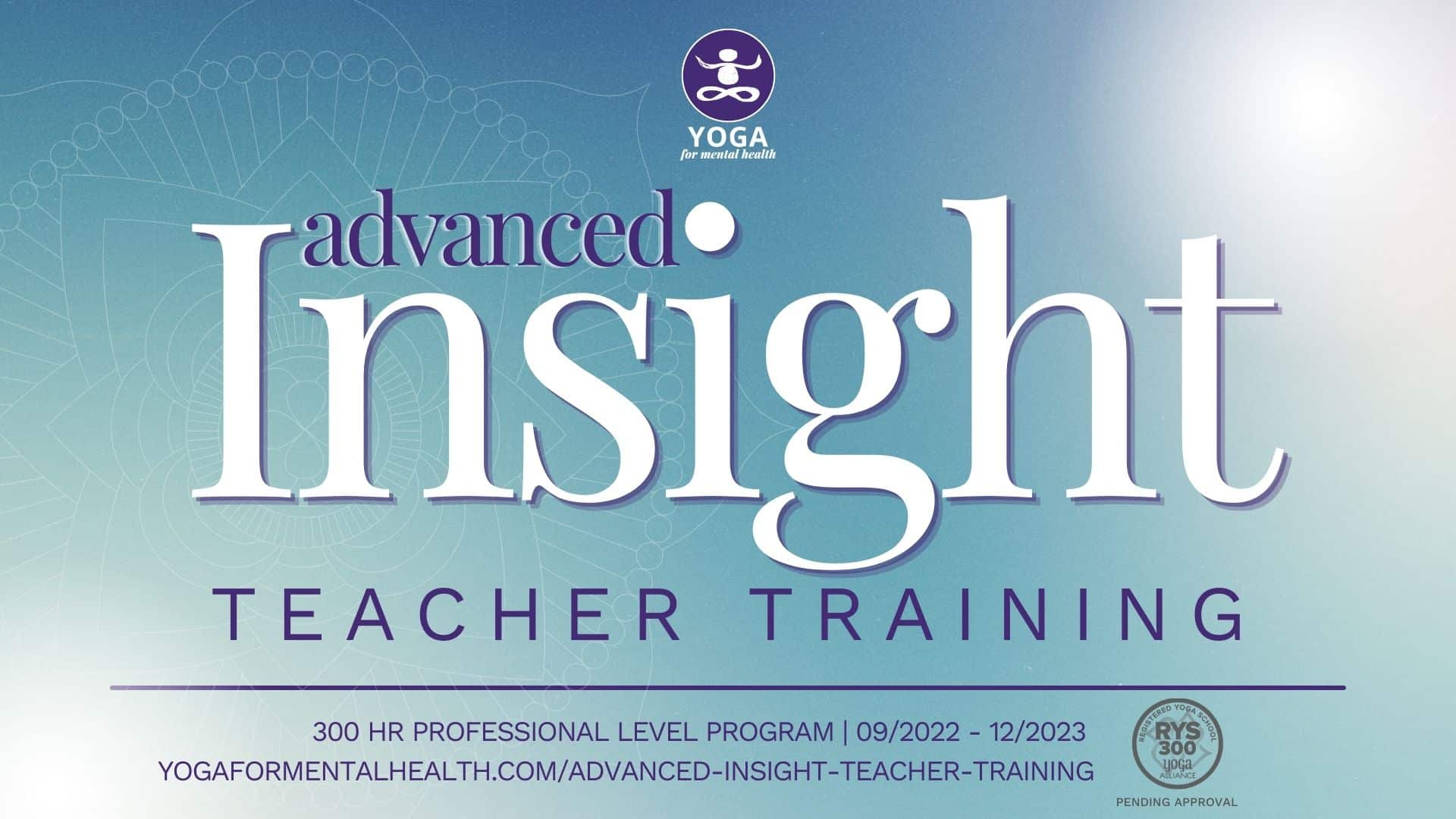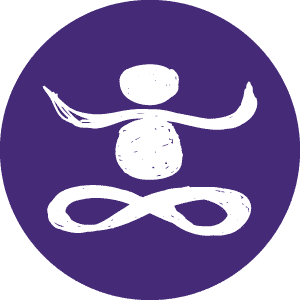Advanced Insight Teacher Training 2022-2023
About our Advanced Insight Teacher Training 2022-2023 Online Course
Course Overview
This is a module based certification and continuing education program for both aspiring and working yoga professionals. Key concepts guiding the program include: inquiry, service, gratitude and beauty. The classical eight-limbed path of yoga and related teachings, particularly as taught in the Iyengar and Vipasana traditions will be central. Modern neuroscience and psychology will be addressed and explained. Moral, behavioral, postural, breathing, sense and mental attributes of practice will be considered. Successful students will demonstrate a growth mindset and the application of physical practices over time. While this program is almost entirely online and offers both synchronous and asynchronous opportunities to connect with teachers, in person training is also required for all students requesting certification. Our aim is to support and prepare sensitive, skillful, ethical, and well-rounded teachers. Our students learn how to integrate therapeutic intent and technical skills in the application of yogic principles. It may be used for both personal and professional development purposes. This program follows the guidelines, established by Yoga Alliance, for 300 hour yoga teacher training programs. It provides opportunities for advancement for dedicated yoga professionals. The Program Director, Manager and Faculty will provide encouragement, information, feedback and space for students to develop competence. Students will be asked to commit to home practice and to collaborate with other yoga practitioners by participating in group teaching sessions. Individual consultation and supervision will be available to support personal and professional development as needed. Upon completion, students will receive certification which will allow them, in conjunction with their 200 hour training, to register with the Yoga Alliance as RYT, Registered Yoga Teacher, 500 Level.
[/et_pb_text][/et_pb_column][/et_pb_row][/et_pb_section][et_pb_section fb_built=”1″ _builder_version=”4.17.4″ _module_preset=”default” global_colors_info=”{}” theme_builder_area=”post_content”][et_pb_row column_structure=”1_2,1_2″ make_equal=”on” _builder_version=”4.17.4″ _module_preset=”default” global_colors_info=”{}” theme_builder_area=”post_content”][et_pb_column type=”1_2″ _builder_version=”4.17.4″ _module_preset=”default” global_colors_info=”{}” theme_builder_area=”post_content”][et_pb_image src=”https://yogaformentalhealth.com/wp-content/uploads/ymh-retreats.jpeg” title_text=”ymh retreats” _builder_version=”4.17.4″ _module_preset=”default” global_colors_info=”{}” theme_builder_area=”post_content”][/et_pb_image][/et_pb_column][et_pb_column type=”1_2″ _builder_version=”4.17.4″ _module_preset=”default” global_colors_info=”{}” theme_builder_area=”post_content”][et_pb_text _builder_version=”4.17.4″ _module_preset=”default” text_orientation=”justified” global_colors_info=”{}” theme_builder_area=”post_content”]Advanced ITT Course Detail
[/et_pb_text][et_pb_button button_url=”https://yogaformentalhealth.com/download/3739/” button_text=”Download the catalog” _builder_version=”4.17.4″ _module_preset=”default” custom_margin=”||15px||false|false” global_colors_info=”{}” theme_builder_area=”post_content”][/et_pb_button][et_pb_button button_url=”https://yogaformentalhealth.com/download/3745/” button_text=”2022 ITT Flyer” _builder_version=”4.17.4″ _module_preset=”default” global_colors_info=”{}” theme_builder_area=”post_content”][/et_pb_button][/et_pb_column][/et_pb_row][/et_pb_section][et_pb_section fb_built=”1″ _builder_version=”4.17.4″ _module_preset=”default” global_colors_info=”{}” theme_builder_area=”post_content”][et_pb_row _builder_version=”4.17.4″ _module_preset=”default” global_colors_info=”{}” theme_builder_area=”post_content”][et_pb_column type=”4_4″ _builder_version=”4.17.4″ _module_preset=”default” global_colors_info=”{}” theme_builder_area=”post_content”][et_pb_text _builder_version=”4.17.4″ _module_preset=”default” text_orientation=”justified” global_colors_info=”{}” theme_builder_area=”post_content”]Advanced ITT Course Content
[/et_pb_text][dipl_tabs tab_orientation=”vertical” content_bg_color=”#f9f9f9″ active_tab_background_color=”#6D0A3E” tab_alignment=”left” tab_background_color=”#482374″ tab_max_width=”250px” _builder_version=”4.17.4″ _module_preset=”default” active_title_text_color=”#FFFFFF” title_text_color=”#FFFFFF” body_text_text_align=”justify” global_colors_info=”{}” theme_builder_area=”post_content”][dipl_tabs_item title=”Yoga for Mental Health II” _builder_version=”4.17.4″ _module_preset=”default” global_colors_info=”{}” theme_builder_area=”post_content”]This course will continue to develop the themes introduced in Yoga for Mental Health I. Students who did not complete this course as part of their 200 hour training will be asked to demonstrate understanding of the material and/or complete the course online.
Current and evolving theories related to polyvagal theory, trauma recovery, emotional intelligence, and neural networking will be considered in relation to yoga practices, professional opportunities and responsibilities.
Cultural considerations including race, gender, sexual orientation, and socio-economic conditions, in addition to neurological and epigenetic factors affecting learning styles and multiple intelligences will provide significant opportunities for reflection.
This course supports dedicated practice, over the duration of the training and will provide students with regular opportunities to connect. 10 Essential Postures is the backbone of the course and in this advanced version students can expect to understand the dynamics of movement in all planes and the energetic of staying still.
Students will learn to distinguish between deep and superficial effort and know what is needed to both move into and stay in position, and with the practice as a whole. The essential postures will be explored in all of their complexity and students will come to see the components of these postures expressed in both familiar variations and new ones.
Everyday integration of posture insights, and the ability to track change over time will mark a student’s successful completion of this course.
The Pancamayakosha model of experience will provide the framework for this monthly practice where students and lead teacher will gather in real time to process experience. Students can expect to practice svadyaya (self-reflection) and communication as they engage with their own experience and each other. Practice in session may include written, oral, meditation, and movement methods. A dedicated practice space and journal will be essential for successful completion of this course. Students will learn to identify motivation, strategies, and obstacles on their paths and will, by the end of the first year of the program, have identified a focus area which will lead them into their Practicum.
The teaching Practicum for the 300 hour course will follow the theme identified in the professional Seminar. Students will develop, receive feedback on, and offer to the community a practice opportunity based on their theme.
Yoga immersions provide students with a structure that will encourage them to focus more intently on practice in both formal and informal ways. Retreats offer exposure to the “yoga lifestyle” that includes mindful eating and consumption, engagement in supportive community, and plentiful opportunities for meditation and movement practice.
Both residential and non-residential options are offered and students who need additional accommodations should address these with the Program Director.
Sun salutations are a long-established part of the yoga tradition. These may take on many forms. The most common versions are found within the more dynamic vinyasa styles. Here the salutation becomes the building block for the entire sequence. For many, these may seem rather daunting and limiting depending on one’s practice. But that is only an example of this diverse yoga technique. Other approaches exist that are more accessible, and inclusive.
We will explore different styles of salutations. These will range in expression, from the more physically demanding to the gentler and mindfulness-based versions. A variety of examples will be presented, offering different perspectives on this series of gestures. Behind all of them, the possible origins, symbolism and purpose of this sequence will be explored, then questioned. Ultimately, each participant will be asked to create his, her, their own version for personal use.
The Bhagavad Gita is a foundational text of yoga and one of the most read across the yoga world. But it is less known within our contemporary context. Some may have learned the general tale of this saga. They may be familiar with certain characters such as the young warrior Arjuna or maybe his advisor Krishna. They may even know the general storyline and the basic context leading up the events related in The Bhagavad Gita. Still, very few wander into its purpose and meaning.
This session will introduce the basics of The Bhagavad Gita while exploring its deeper ramifications for both practice, teaching and life. Our study begins with a synopsis, setting it within the context of Indian history, literature and cultural. We will explore key philosophical ideas around the classification/ definitions of yoga especially that of service found within the text. Then, participants will reflect on possible modern interpretations.
The objective is to incorporate the story into one’s practice as a teacher and student. The course will place a special emphasis upon the story’s relevance to teaching and living a yoga lifestyle in today’s world. Along the way, different asana and meditative techniques will be practiced and a variety of reflective exercises will be offered.
This course explores what it means to be a yoga teacher, both within the public sphere and in one’s own personal life. Beyond offering classes and other such related activities, yoga suggests there is a code of conduct behind the practice. The Yoga Sutras best describes these by listing five sets of communal/personal ethics, the yamas and the niyamas. These serve as the foundation for this inquiry. We will approach these ethical ideas as questions to reflect upon rather than mandates on how to be. This exploration will include provided content, possible discussion as well as assigned reading. Different leaders, activists and yoga figures may provide us with examples for these ethical ideas, sometimes positive, maybe negative or probably somewhere in between. Rather than remain in the theoretical, participants will be asked to journal on how these ethics relate to their life and possible work as yoga teachers.
This course focuses on the art of teaching including planning and facilitating the group experience. We will explore how the creativity of class design can inspire personal practice and growth as we learn and practice sequencing models that address peak poses, themes, and action-based classes.
We will refine how we share and guide practice by learning cueing techniques for different learning modalities, exploring our voice, and honing verbal adjustments for effective results.
We will the explore the teacher’s role in holding space and cultivating the tone of class.
You are connected. You are one. This course is an exploration of fascia in the body, yoga, and movement practices.
Fascia is connective tissue that surrounds, holds, and integrates your muscles, bones, and organs. Fascia infinitely connects each and every part of you into one complete form. This workshop develops an intellectual and embodied understanding of how your body balances and interrelates. Each session begins with an informative talk to develop a deeper understanding of the vastness and significance of fascia’s function and form, followed by a practice to help us feel and integrate our new body perception.
The course will help students:
• Gain tools to unravel tension and address pain.
• Create more mobility, ease, and functional strength in your body.
• Improve the effectiveness and safety of yoga, sports, training, and movement practices. • Enhance your body’s reception to massage and bodywork.
• Understand the physiological connections in your body.
Props required for this course cost $42 and may be either picked up in Anchorage or shipped to you (for an additional charge.)
In this course we will learn and practice the fundamental actions of hand stand, elbow balance, shoulder-stand, and headstand. Discussion will include functional principles, variations, contraindications, and progression of poses to guide students towards these inversions. Time will also be allotted for group and individual exploration of concepts.
In this course, students will learn and practice the common pranayama techniques. These include sama vrrti, viloma krama, anuloma krama, box breathing, nadi shodhana, ujjayi, shitali/sitkari, bhramari. Instruction will include how to do seated and reclining postures, mudras, ratios, and suspensions. Benefits, contraindications, and variations will also be discussed.
The anatomy and functioning of the chest cavity (ribs, diaphragm and lungs), ways to feel physical movement of the breath, and exploration of the subtle energies of the breath (prana, apana, shusumna and chakras) will be incorporated in addition to references to pranayama in the Hatha Yoga Pradipika and Patanjali’s Yoga Sutras.
Successful students will create a 15 minute Pranayama practice that includes a warm up and 3 – 5 techniques and meditation. They will describe each technique, its effects, and the timing for each technique as well as the overall effect of the sequence.
This course will show students how to incorporate pranayama as a preparation, as part of, or at the end of an asana class. Students can expect to learn to use asana to prepare for pranayama, to develop awareness of the movement of breath and to explore the energy of the breath. They will learn how to apply koshas, bandhas and inner senses to experience the movement of prana (vital energy) and how pranayama fits into the 8 limb system of Patanjali’s Yoga Sutras.
Classes will include check in and discussion of postures and pranayama techniques (including questions and observations about student’s home practice), one hour asana and pranayama practice, and time for review and questions.
Successful students will create a 30 minute asana and pranayama practice that has a theme or focus that connects to the intention/purpose of yoga.
Using asana, pranayama and meditation this training will explore common causes of back pain and how to use yoga as a modality. Students will practice asana for some common causes of back pain. Students will get an opportunity to teach poses suggested for back care and pain.
This training will incorporate lecture, demonstration, and practice/movement exploration. Students needing modifications will be assisted and given several options to meet their unique needs. After each section we will have time for questions and answers. This training will cover the anatomy and physiology of common causes of back pain including herniations, spinal stenosis, tight QL’s, tight hamstrings, S.I. derangement, spondylolisthsis, arthritis, scoliosis, and piriformis syndrome.
We will discuss how to apply yoga teachings in daily life such as:
Committing yourself to a daily practice.
Creating a sacred space for your practice.
Positive thinking; expressing appreciation for acts done for your good, writing in a journal, loving yourself, and recognizing your own inner strength.
This training will cover sutras encouraging: Practice becomes grounded (1.14) Compassion( 1.33)
Non harming, (11.35).
Students will be required to teach their peers incorporating suggested back care asanas. They will also provide a framework/ lesson plans for teaching a multi level yoga class addressing back care concerns.
This training will provide participants with many options on how to modify asanas to accommodate the diverse needs of yoga students. It will incorporate lecture, group discussion, demonstration, and practice. Students will consider the importance of props, and how to differentiate a yoga class to include various abilities and conditions. This training will discus the importance of the different groups of poses including the anatomy and physiology of each group.
We will discuss karma yoga and selfless service, service to marginalized populations. We will discuss the principals of the Yamas and Niyamas and how they translate to teaching yoga to different populations or self love.
Students will teach variations of asanas to peers/group. Students will also provide lesson plans that incorporate different abilities in a yoga class. Students will be required to teach their peers incorporating suggested back care asanas. They will also provide a framework/ lesson plans for teaching a multi level yoga class addressing back care concerns.
Apply Here
Once you submit your application and pay your application fee you can expect to hear from us within 1-2 business days.
[/et_pb_text][et_pb_button button_text=”Click here to apply” button_alignment=”center” module_class=”rv_button_1 rv_button_closed” _builder_version=”4.17.4″ _module_preset=”default” global_colors_info=”{}” theme_builder_area=”post_content”][/et_pb_button][/et_pb_column][/et_pb_row][et_pb_row module_class=”rv_element rv_element_1″ _builder_version=”4.17.4″ _module_preset=”default” global_colors_info=”{}” theme_builder_area=”post_content”][et_pb_column type=”4_4″ _builder_version=”4.17.4″ _module_preset=”default” global_colors_info=”{}” theme_builder_area=”post_content”][et_pb_text _builder_version=”4.17.4″ _module_preset=”default” text_text_color=”#FFFFFF” text_font_size=”18px” global_colors_info=”{}” theme_builder_area=”post_content”]Application Fee: $75
Course Price: $5250
[/et_pb_text][et_pb_wc_add_to_cart product=”3413″ show_quantity=”off” show_stock=”off” field_label_position=”inline” module_class=”ymh-itt-forms” _builder_version=”4.17.4″ _module_preset=”default” field_label_text_color=”#FFFFFF” global_colors_info=”{}” theme_builder_area=”post_content”][/et_pb_wc_add_to_cart][/et_pb_column][/et_pb_row][/et_pb_section]
Course Content


